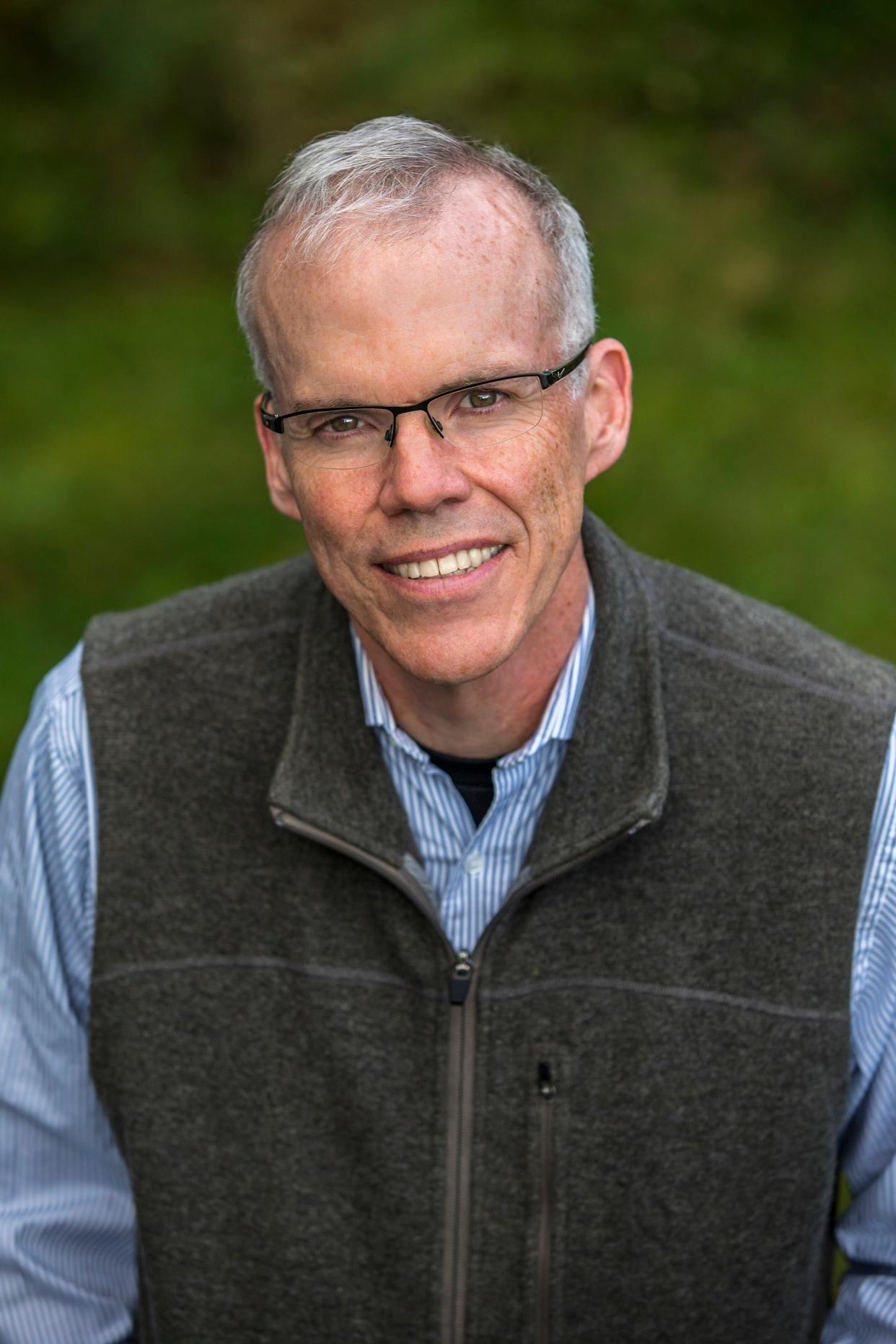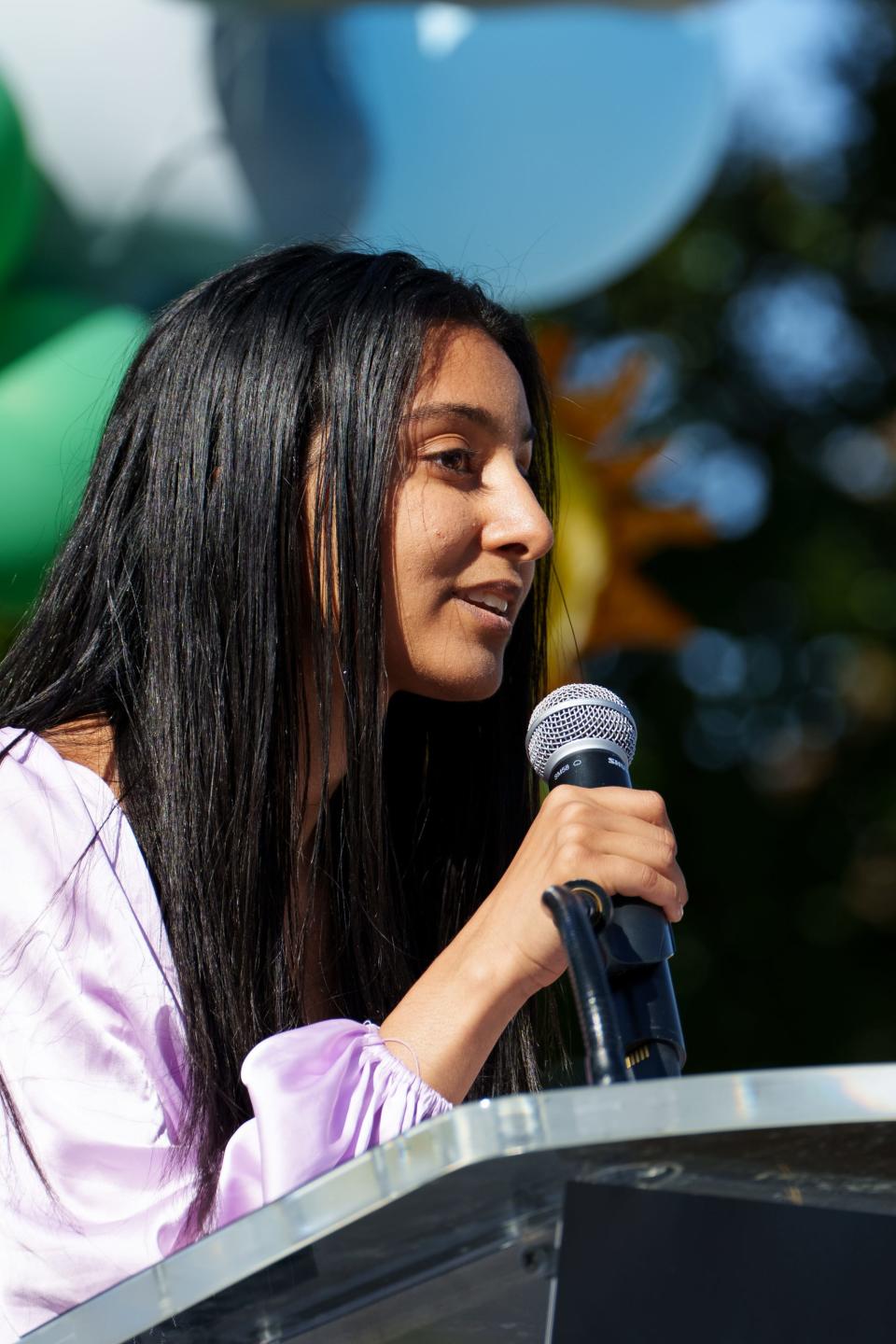Bill McKibben's Third Act calls on 'graying' Arizonans to join the environmental movement

- Oops!Something went wrong.Please try again later.
- Oops!Something went wrong.Please try again later.
Bill McKibben is ready for his third act.
In the past year, the prolific environmentalist has hailed new federal electrification funding as a last chance for widespread change in a New Yorker essay, penned a plea for homeowners to say yes to solar and wind projects in our shared "backyard" lands for Mother Jones and published a book about what it means to be a patriot from the perspective of a "graying American."
Now, he's recruiting graying Arizonans to join him in rethinking their role in the environmental movement.
"Kids are doing extraordinary work organizing around climate change," McKibben said in a video produced by PBS News Hour. "But there is something a little undignified about taking the biggest problem that the world has ever gotten into and asking junior high school students to solve it for you."
McKibben founded Third Act as a way for people over 60 to get involved in the climate fight. Within 24 hours of the organization's September 2021 "soft launch" in Vermont where he lives, thousands of people had signed up, according to an article in the VT Digger.
This month, the fight is coming to Arizona.
Recruiting Arizona's seniors to fight climate change
On May 18 at 6 p.m., hundreds of seniors are scheduled to gather virtually to launch Third Act Arizona as an official working group.
The event will feature appearances by McKibben as well as notable Arizona locals including Attorney General Kris Mayes, Ginger Sykes Torres, the state executive director of the USDA Farm Service Agency and member of the Navajo Nation, and Diana Liverman, a University of Arizona geographer and international climate change report author. The organizing committee for the local chapter will relay participant questions to the speakers and help lead a discussion about next steps in the state.
Those interested in joining can register to receive the Zoom webcast link at https://thirdact.org/events/az-launch/.
More: The race to produce hydrogen fuels in Arizona is on. It's promising, but not yet funded
McKibben says participation in climate action by the over-60 demographic will be essential to timely progress because of the outsized population, voting record and resources of this group.
"There’s a lot of us, 70 million people over the age of 60," McKibben told PBS News Hour. "We punch way above our numbers politically, because we all vote. And, fair or not, we ended up with most of the money. Baby Boomers and the Silent Generation have about 70 percent of America’s financial assets."
This imbalance of wealth, influence and prioritization of climate concerns is keenly felt by young Arizonans trying to organize around climate action.
"Because we were born into this, I feel like there's a difference in how we perceive the intensity behind this crisis," Saiarchana Darira, a youth climate activist based in Phoenix, told The Republic last year. "There's a huge gap between policymakers and young people and how we can get involved in these climate decision-making spaces, because a lot of times they're going to seem very inaccessible."

Rev. Doug Bland, who recently retired from full-time work as a faith leader and climate organizer with Arizona Interfaith Power & Light, is excited about Third Act coming to Arizona.
"We baby boomers owe a major debt to younger generations, including my two grandchildren," Bland wrote this week in an email to The Republic. "My generation, partly out of ignorance and partly out of greed, benefited economically from burning fossil fuels, but we have left a great burden on our children and grandchildren. Our extravagance threatens their future."
More: The climate crisis stresses me out, too. But I'll read the hate mail and call it hope
A graying American looks back and wonders what happened
Rejecting implications of generational guilt may contribute to higher rates of climate change denial or dismissiveness among older Americans. A 2021 Pew Research Center poll found that only 57% of Boomer and older generations felt that climate should be a top priority to ensure a sustainable planet for future generations, compared to 71% of Millennials and 67% of Gen Z members. But neither pointing fingers nor eschewing blame brings us closer to solutions.
In founding Third Act, McKibben calls on those over 60 to remember the fundamentals of patriotism he and contemporaries were raised on and channel that hunger for freedom from domineering forces (like the British or "the man" or the global oil industry) into the climate fight.
He sees battling power imbalances as distinctly American. In his 2022 book, "The Flag, the Cross and the Station Wagon: A graying American looks back at his suburban boyhood and wonders what happened," he writes about a job he once held in Lexington, Mass., as a tour guide reenacting scenes from the Revolutionary War, when America's founders worked together to upend overbearing British rule and taxation.
"The valor of standing up to unjust and arbitrary power seem to me its clear and obvious moral," McKibben writes, recalling the legends of revolutionary bravery he retold for tips in his youth. "I want to draw the picture in as bold lines as possible. Because soon enough the picture is going to get much more shaded, much less noble."

He goes on to write about how three classic symbols of American freedom — the flag, the cross and the station wagon — would later be transformed into emblems for the unfettered burning of fossil fuels and destruction of the land Americans once fought to call home. (Land that was taken from the Indigenous peoples who first called it home.)
Much of the Third Act's action focuses on helping Americans divest financially from fossil fuel interests by educating members on how to move their own assets into less harmful funds and urge their banks to stop underwriting oil expansion. Many activists feel that major change to reduce the greenhouse gases emitted into the atmosphere by the burning of fossil fuels for energy that are causing average global temperatures to rise won't happen until banks are incentivized by shareholders to cut off enabling lending to oil companies.
Bland, too, has something to say about the misappropriation of the cross to recast the values upon which our society is built, and how the nation's wealth can be used to right this wrong.
"Jesus tells a parable about those who would cause young ones to stumble, saying it would be better to have a millstone tied around their neck and drown them in the sea. (Matthew 18:6)," Bland wrote. "Pretty harsh! But the drowning is happening. Those of us with gray hair and 65 to 70% of the nation's wealth should be on the front lines of the fight for climate justice. The Third Act is a good place to join the fight."
Read the climate series: The latest from Joan Meiners at azcentral, a column on climate change that publishes weekly
Sykes Torres, one of the speakers lined up to help launch the Arizona chapter on May 18, has flowing dark (not gray) hair, but stands behind the virtue of a society following the lead of older generations.
"I'm Navajo, Native American, and in our culture, elders are some of the wisest folks," Sykes Torres said. "We get a lot of our directions as younger generations from our elders. And so I think giving them the platform and the ability to advocate for what they feel is needed in our country as far as climate action, I think it's important for democracy."
Joan Meiners is the climate news and storytelling reporter at The Arizona Republic and azcentral.com. Before becoming a journalist, she completed a doctorate in ecology. Follow Joan on Twitter at @beecycles or email her at joan.meiners@arizonarepublic.com. Read more of her coverage at environment.azcentral.com.
Support climate coverage and local journalism by subscribing to azcentral.com at this link.
This article originally appeared on Arizona Republic: Bill McKibben's Third Act calls on graying Arizonans to join climate fight

